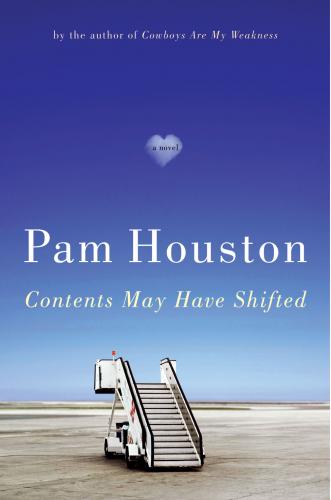 Aisles
Aisles
Jetlag
Contents May Have Shifted
by Pam Houston
Review by Rachel Greben
 ave you ever had a friend who is both terribly gifted and emotionally exhausting? She has so much to offer, but every conversation ends in a similar fashion: she’s off to yoga, and you end up tired and a little resentful. The kind of friendship that makes you ponder how much of friendship is really just an exercise in self-involvement.
ave you ever had a friend who is both terribly gifted and emotionally exhausting? She has so much to offer, but every conversation ends in a similar fashion: she’s off to yoga, and you end up tired and a little resentful. The kind of friendship that makes you ponder how much of friendship is really just an exercise in self-involvement.
Pam Houston’s Contents May Have Shifted is the quintessence of the gifted/exhausting friend syndrome. The novel—which chronicles the life of “Pam Houston,” the character—is comprised of 144 short chapters numbered and delineated by geographical locations, a framework which eventually begins to feel like counting down the exits in a nighttime drive down a number of large states. Chapters move briskly through domestic and international sites such UC Davis, Barcelona, the kingdom of Bhutan, and Creede, Colorado. Each chapter is polished and can stand alone, but Pam’s relationships with friends, pets, and lovers tie the material together. The travel scenes, racing back and forth like Rick Steves on speed, ultimately serve to show how these relationships mask, heal, or exacerbate Pam’s childhood wounds.
Houston’s voice is funny and intimate, like a friend. Her writing is imbued with love of everything, even in the darkest moments. She is gifted with humor and the ability to nail a moment, whether it’s a wry epiphany or a boyfriend’s poor form. She possesses a poet’s gift for describing odd or beautiful natural moments, like the nighttime “bioluminescence that gets created when aquatic glowing microorganisms get slammed into something solid like rock.” Unfortunately, these remarkable moments are themselves slammed one on top of the other, chapter after three-page chapter. The insightful travel scenes fall on the heels of insightful relationship moments, with wise bits of insight from friends and new age healers thrown in between. There is no time to dig into any of these well-rendered landscapes, relationships, or emotions, and we feel like a tired tourist in the schema of character-Pam’s life.
Houston is a smart and insightful writer, and there is method to her madness. The “Pam” she depicts seems to enjoy the tension between moving and standing still, and it’s clear she’s getting to a larger point. All of these people and places—all of these moments—compose the unique grandeur of being alive, and are in themselves the reasons for living. This message is posed as the author’s gift. In the end, it’s up to the reader to decide if the gift is worth the fatigue.
 In the science fiction issue, Rachel Greben wrote about John Christopher's "Tripod Trilogy."
In the science fiction issue, Rachel Greben wrote about John Christopher's "Tripod Trilogy."


